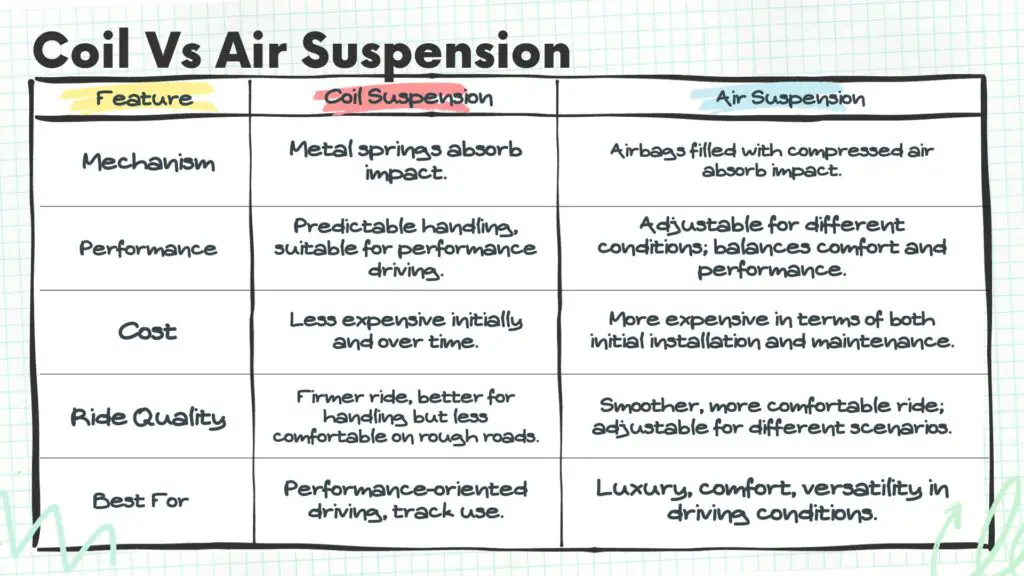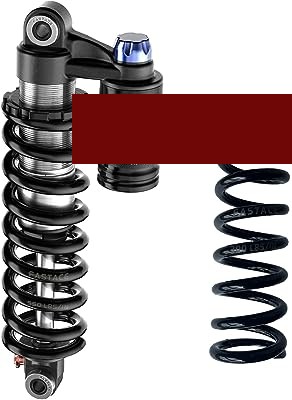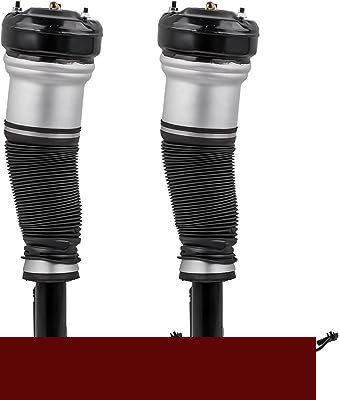Coil vs. air suspension is a debate that has long been at the forefront of discussions in the automotive industry. Some experts highly appreciate the incredible comfort and ride quality of air suspension. Whereas others keep the coilover suspension on top of their choice because of the longevity and cost efficiency.
So, as an ordinary driver, the whole fact might seem a bit complex to you to decide which one you should pick. Hold on, don’t be hopeless yet. Whether you are looking to upgrade your current vehicle’s suspension or gain insights into these two technologies for future purchases, we’re here to help you out.
Our comprehensive analysis aims to equip you with the knowledge necessary to make an informed decision based on your driving preferences and needs.
Read also: How To Choose The Right Suspension System For Your Car
Coil Vs Air Suspension In a Table

What is Coilover Suspension?

Coilover suspension is a type of suspension system commonly used in high-performance vehicles. The term coilover is derived from the combination of coil referring to the coil spring, and over indicating that it is mounted over the shock absorber.
This means that instead of having separate springs and shocks, the coilover suspension incorporates both components into a single assembly. The coil spring is responsible for absorbing the bumps and vibrations encountered while driving, while the shock absorber controls the motion of the spring, ensuring smooth and controlled handling.
Pros and Cons of Coilovers
Pros:
- Suitable for optimizing handling capabilities.
- Boasts enhanced longevity when contrasted with air suspension systems.
- Provides an extensive selection of adjustments, comprising height, compression, camber, caster, and various other specifications.
Cons:
- Frequently, a firmer suspension is experienced
- Modifying the ride height entails utilizing tools and removing the wheels.
- Riding around often gets bumpier
Read also: Optimizing Suspension Performance: A Comprehensive Guide to Adjusting Coilovers
What Is an Air Suspension?

An air suspension is a type of vehicle suspension system that uses compressed air to support the weight of the vehicle. It replaces traditional coil or leaf spring suspensions and offers several advantages.
By adjusting the air pressure, drivers can customize the ride height and stiffness of their vehicle, resulting in improved comfort and handling. The key component of an air suspension system is the air springs or bellows. These are rubber bags filled with compressed air that replace traditional steel springs.
When the vehicle encounters bumps or uneven surfaces on the road, these air springs absorb and dampen shocks, providing a smoother ride for passengers. The compressed air also acts as a cushioning agent between various components of the suspension system, reducing vibrations and noise.
Pros and Cons of Air Suspension
Pros:
- Excellent ride height adjustability
- Seamless and comfortable journey
- Ability to transport substantial loads
- Can effortlessly navigate car ramps before maintenance, simplifying the driving process.
Cons:
- Air suspension is quite expensive
- Most air ride kits fail to match the exceptional performance provided by coilovers.
- Shorter lifespan
Read also: Pros And Cons Of Air Suspension – Justify Your Investment
Coil Vs Air Suspension – Key Facts to Compare
Both these systems serve the purpose of providing a comfortable and smooth ride, but they differ significantly in their mechanics and performance. When it comes to choosing between coil and air suspension, it is crucial to understand the key differences and evaluate which system suits your specific requirements.
So, let’s take an extensive look at the debate between air suspension and coilovers sheds light on key facts for comparison purposes.
Ride Quality and Comfort
Air suspension excels in this precise area. Depending on the spring rate and shock valve settings, coilovers may feel harsher when encountering bumps. On the other hand, air suspension effortlessly glides over them, ensuring a smoother ride.
Additionally, air suspension allows for convenient adjustment of your car’s ride height at any time with a simple press of a button. With air suspension, you can also add extra weight to your vehicle without worrying about it bottoming out or becoming unbalanced.
Furthermore, the elevated ride height provided by air suspension prevents sagging in the rear end of your car and consequently reduces tire wear and tear. While coilovers can be installed on a daily driver, they cannot match the comfort offered by air suspension.
Yes, coilovers can assist in supporting increased loads, but their primary purpose is to enhance performance.
Outlook
To be frank, when it comes to installing an air suspension, it’s not solely about the comfort factor but also the visually striking appearance that is sure to catch attention. The allure of witnessing one’s car gracefully touching the ground cannot be denied by any motor enthusiast.
Particularly for those who frequently attend car events, air suspensions are deemed perfect due to their ability for instant adjustment with a simple push of a button. In contrast, coilovers demand significantly more laborious efforts in order to achieve the desired height alterations for your vehicle.
Durability
When it comes to comfort and aesthetic appeal, air suspensions may excel; however, they tend to fall short in terms of longevity. This drawback is not specific to any particular manufacturer but rather stems from the complex interdependence among various components within air suspension systems.
These systems heavily rely on moving parts and computer-controlled elements which make them highly vulnerable to failures. Each piece within an air suspension system is reliant on others for proper operation.
For instance, if there is a leak in one of the air springs (a common problem), other components such as ride height sensors and the compressor have to compensate for it. As a result, premature failure can occur not only in the affected spring but also in these supporting elements.
On the contrary, coil suspensions offer simplicity along with ruggedness and durability due to their uncomplicated design and construction using robust materials.
By eliminating the need for moving parts, coil suspension significantly reduces the chances of encountering issues. Moreover, the utilization of exceptionally durable materials in static components further enhances its longevity, making it a clear winner over air suspension in this aspect.
Handling
If you are seeking to enhance the handling of your vehicle, coilovers offer an optimal solution. These specialized suspension systems are carefully calibrated to minimize body roll, making them particularly well-suited for activities such as drifting, track days, and spirited driving. Coilovers provide greater stability and control when pushing the limits on the road or race track.
In contrast, air ride suspension is more appropriate for everyday commuters looking for a smooth and comfortable driving experience. This type of suspension system employs air springs that can be adjusted to varying heights, allowing drivers to customize their ride quality based on personal preference or driving conditions.
Track Performance
Coilovers are primarily utilized in motorsports due to their consistent behavior, ensuring reliable performance on the track. When driving at high speeds, exceptional handling and control during cornering are essential, and this is precisely what Coilovers excels at delivering.
In the past, air suspensions were frequently employed in NASCAR as they could withstand heavy loads while maintaining balance and ride quality. However, drivers eventually made the switch to coilovers because they sought out the predictability and dependability offered by this suspension system.
Coilovers can adapt to various scenarios without requiring manual adjustments. This adaptability is achieved through custom winding the springs to withstand different levels of compressive force. It should be noted that air suspensions cannot match the same level of performance as coilovers can provide.
Additionally, when evaluating air suspension versus coilovers for track utilization, it becomes apparent that coilovers offer the flexibility to tailor multiple performance attributes of your suspension system.
Cost
Air suspensions offer a comfortable ride but at a significant expense. Replacing air suspension components or getting them repaired at the dealership can be extremely costly.
This includes specialized computers like the suspension control module and the air compressor. However, it is the air springs that often come with the highest price tag and are most prone to wearing out.
Depending on your car’s make and model, a single air spring can cost well over $1,000. Since all four springs tend to wear out at a similar rate, eventually you will need to replace them all. Despite being made of more durable materials, a high-quality coil suspension kit that can replace the entire suspension system is available.
Which One Should You Choose?
So, should you pick an air suspension or coilovers? Ultimately, it all boils down to what you want from your car’s handling and performance and where you plan on driving it.
Your budget also plays a big role here – those air suspension kits can break the bank! So here’s the deal: If you’re all about improving your ride’s overall performance, go for coilovers.
They’ll give you mad predictability and killer handling whether you’re tearing up the streets or hitting up the track. But hey, if a smooth-as-butter ride with total adjustability and that low-key slammed look is more your style, then bags are where it’s at.
Plus they can handle more weight without throwing off your car’s balance – pretty sweet! Just don’t be shocked when those air suspensions start wearing out faster than coilovers; keeping them in good shape or replacing them can put a dent in your wallet for sure!
